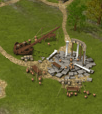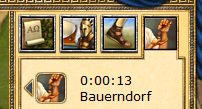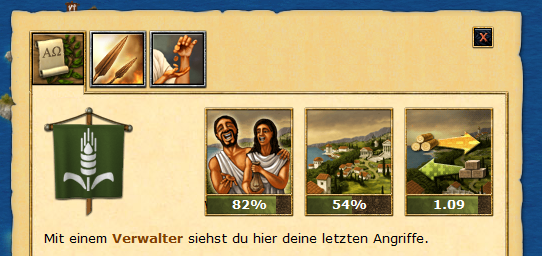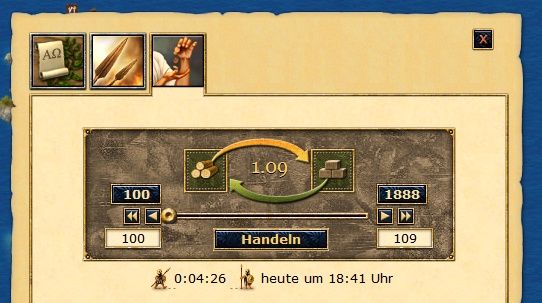Trade: Difference between revisions
No edit summary |
|||
| Line 3: | Line 3: | ||
Da jede Insel nur einen dieser Rohstoffe besonders gut, allerdings auch einen anderen schlecht fördert, spielt der [[Handel]], insbesondere zu Beginn mit [[Bauerndörfer|Bauerndörfern]], eine große Rolle. Denn nur so ist es möglich, genügend jedes Rohstoffes zur Verfügung zu haben - und die Polis kann wachsen und gedeihen. | Da jede Insel nur einen dieser Rohstoffe besonders gut, allerdings auch einen anderen schlecht fördert, spielt der [[Handel]], insbesondere zu Beginn mit [[Bauerndörfer|Bauerndörfern]], eine große Rolle. Denn nur so ist es möglich, genügend jedes Rohstoffes zur Verfügung zu haben - und die Polis kann wachsen und gedeihen. | ||
== | == Trade with farmer villages == [[File:Market town 0.png|miniatur|Der market place in the building.]] In order to balance the uneven production of the three raw materials, to operate is it important, with farmer villages on the own island trade. | ||
[[File:Market town 0.png|miniatur|Der | |||
=== | = = = Prerequisites = = = prerequisite the [[Marktplatz is solely]] on '' 'step 1'' '. Yet therewith one in the end trade partner finds, should maintain one a good relation to the farmer villages: The [[Bauerndörfer|Stimmung for is]] lower than 80, the village does not let itself on a trade a - and one must wait until the mood climbed again. | ||
=== | = = = Ratios = = = you found on your island a farmer village, that is ready yourself to act yourself you, see you in the context menu of this village, with which raw material and, yourself which course it offers you the trade: [[File:Handel 1.png|miniatur|left]] To the right you see now that the inhabitants '''[[File:Stone.png offer]] stone''' (below) and for that '''[[File:Wood.png demand (above)]] wood'''. The green arrow shows therefore, what you get and the yellow arrow shows, what you send for that. | ||
[[File:Handel 1.png|miniatur|left]] | |||
<br style="clear: both;" /> | <br style="clear: both;" /> | ||
=== | = = = The trade ratio = = = the '' 'trade ratio' '' you can read also in the context menu (in this case: 1.09). It indicates how much is valued the farmer village your raw material, therefore get like much you back: For example '' ‚1.00 becomes there'' ' indicated, a trade ratio of 1:1 arises from that. | ||
In | In our example from above (1:1.09) that means: *For '''[[File:Wood.png]] 100 woods''' you get '''[[File:Stone.png]] 109''' stone. | ||
* | |||
A comma value should be arisen rounded in the converting on entire raw materials. *For '''[[File:Wood.png]] 10 woods''' you get '''[[File:Stone.png]] 11''' stone. | |||
* | |||
''' | '' 'Farmer villages can have' basically only 2000 raw materials all at once actions, equal which step the market place. ''. | ||
=== | = = = Actions = = = [[File:Handel 2.png|miniatur|left]][[File:Handel 3.png|miniatur]]Anschließend you click above on '' 'actions' ''. Here you can adjust then how much wood you would like to send. Then yet with a Klick confirm on '' 'actions' '' and both your | ||
[[File:Handel 2.png|miniatur|left]][[File:Handel 3.png|miniatur]]Anschließend | |||
And the strange dealers get going. | |||
The acted raw material (100 woods) is drawn-off immediately and in the city survey, you see yourself the strange dealers arrive, with 109 stones in the baggage, with you. | |||
After the trade, the trade ratio falls per 100 delivered raw materials around '' ‚0.03'' '. | |||
The actions with farmer villages influence '' 'neither the mood nor the strength ''. | |||
In the arrival of the dealer, you receive a report, that once again the course that indicates raw materials and the trade partner. | |||
Independent of mood and strength climbs the ratio around '' '0.02 per hour' '' until it arrived again in the actual ratio. | |||
==Handel mit Spielern== | ==Handel mit Spielern== | ||
Revision as of 13:14, 18 January 2010
Der Marktplatz ermöglicht es dir, mit den drei materiellen Rohstoffen, Holz, Stein und den Silbermünzen, zu handeln.
Da jede Insel nur einen dieser Rohstoffe besonders gut, allerdings auch einen anderen schlecht fördert, spielt der Handel, insbesondere zu Beginn mit Bauerndörfern, eine große Rolle. Denn nur so ist es möglich, genügend jedes Rohstoffes zur Verfügung zu haben - und die Polis kann wachsen und gedeihen.
== Trade with farmer villages ==  In order to balance the uneven production of the three raw materials, to operate is it important, with farmer villages on the own island trade.
In order to balance the uneven production of the three raw materials, to operate is it important, with farmer villages on the own island trade.
= = = Prerequisites = = = prerequisite the Marktplatz is solely on 'step 1 '. Yet therewith one in the end trade partner finds, should maintain one a good relation to the farmer villages: The Stimmung for is lower than 80, the village does not let itself on a trade a - and one must wait until the mood climbed again.
= = = Ratios = = = you found on your island a farmer village, that is ready yourself to act yourself you, see you in the context menu of this village, with which raw material and, yourself which course it offers you the trade:
To the right you see now that the inhabitants File:Stone.png offer stone (below) and for that File:Wood.png demand (above) wood. The green arrow shows therefore, what you get and the yellow arrow shows, what you send for that.
= = = The trade ratio = = = the 'trade ratio' you can read also in the context menu (in this case: 1.09). It indicates how much is valued the farmer village your raw material, therefore get like much you back: For example ‚1.00 becomes there ' indicated, a trade ratio of 1:1 arises from that.
In our example from above (1:1.09) that means: *For ![]() 100 woods you get
100 woods you get ![]() 109 stone.
109 stone.
A comma value should be arisen rounded in the converting on entire raw materials. *For ![]() 10 woods you get
10 woods you get ![]() 11 stone.
11 stone.
'Farmer villages can have' basically only 2000 raw materials all at once actions, equal which step the market place. .
= = = Actions = = =
 Anschließend you click above on 'actions' . Here you can adjust then how much wood you would like to send. Then yet with a Klick confirm on 'actions' and both your
Anschließend you click above on 'actions' . Here you can adjust then how much wood you would like to send. Then yet with a Klick confirm on 'actions' and both your
And the strange dealers get going.
The acted raw material (100 woods) is drawn-off immediately and in the city survey, you see yourself the strange dealers arrive, with 109 stones in the baggage, with you.
After the trade, the trade ratio falls per 100 delivered raw materials around ‚0.03 '.
The actions with farmer villages influence 'neither the mood nor the strength .
In the arrival of the dealer, you receive a report, that once again the course that indicates raw materials and the trade partner.
Independent of mood and strength climbs the ratio around '0.02 per hour' until it arrived again in the actual ratio.
Handel mit Spielern
Sollten die Bauerndörfer der Insel nicht das gewünschte Angebot darlegen kann man alternativ auch mit anderen Spielern handeln. Dazu muss der Marktplatz jedoch auf Stufe 5 ausgebaut sein.
Fremde Angebote
Um Angebote anderer Spieler anzunehmen muss man im Marktplatzmenü das entsprechende Angebot annehmen. Vorher kann man noch festlegen wieviele Rohstoffe man vom Angebot tauschen will, also wieviele Angebote letztendlich bei einem selbst ankommen sollen. Im gleichen Menü kann mach auch nach bestimmten Angeboten suchen.
Angebot erstellen
Um ein Angebot selbst auf den globalen Merkt zu stellen muss man im betreffendem Menü den gebotenen Rohstoff, dessen Menge, den gesuchten Rohstoff und die max. Lieferdauer festlegen. Das Verhältnis bestimmt wieviele Rohstoffe man erhält. Es darf max. bei 1:10 für den Abnehmer des Angebots sein.


